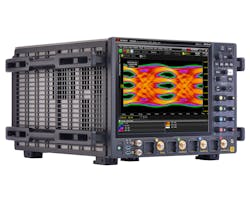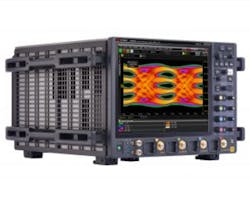UXR Series real-time oscilloscopes support terabit innovators
Santa Rosa, CA. Keysight Technologies has announced the new Infiniium UXR Series, which the company describes as the only oscilloscopes to support terabit research with a real-time bandwidth up to 110 GHz and a sample rate to 256 GS/s.
The Keysight Infiniium UXR Series offers advanced capabilities that enable leading-edge researchers to accelerate time to market with PAM4, 5G, and optical solutions by ensuring signals are clearer, eye diagrams are open, and results are accurate. In addition, when paired with Keysight’s new up to 110-GHz optical modulation analyzer frontend and the VSA-based optical modulation software, the Keysight Infiniium UXR series turn into an end-to-end solution for optical research.
Keysight said the Infiniium UXR Series provides
- 10-bit resolution and industry-leading signal integrity to enable customers to experience superior effective number of bits (ENOB) during characterization of progressively complex modulation standards,
- four full-bandwidth channels to reduce timing error when working with dual-polarization coherent modulation,
- full self-calibration to ensure ongoing measurement accuracy while eliminating the need to take the unit out of service, and
- a chipset based on a Keysight-proprietary Indium Phosphide (InP) process that enables wide bandwidth and low noise floor.
“The Infiniium UXR Series enables development teams to gain an extraordinary advantage in the race to beat their competition to market,” said Ron Nersesian, Keysight president and CEO. “Only Keysight has the expertise to deliver a system that moves multiple performance points ahead simultaneously. The industry-leading 110-GHz bandwidth, [coupled with] low noise floor and jitter, enables the acceleration of new designs in high-speed digital, optical research, wideband wireless, and beyond.”

